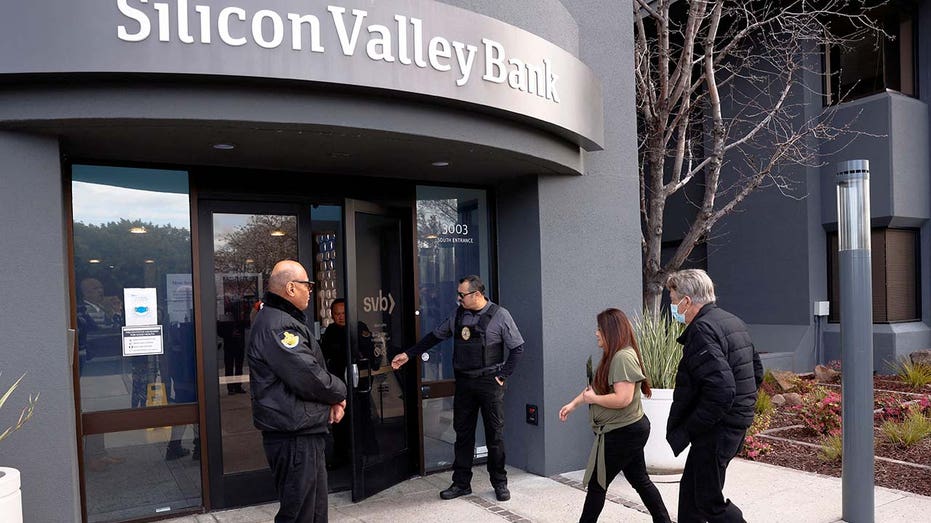Ted Cruz, Jim Jordan press San Francisco Fed on Silicon Valley Bank collapse
SVB's failure has raised questions over Fed's oversight, how collapse could have been avoided
SVB collapse causing venture capital to dry up: Wainwright
The RealReal founder and former CEO Julie Wainwright discusses the start-up landscape and the problems facing small businesses as regional banks struggle on "The Claman Countdown."
The Federal Reserve Bank of San Francisco is facing calls for transparency from Senate Commerce Committee ranking member Ted Cruz, R-Texas, and House Judiciary Committee Chairman Jim Jordan, R-Ohio, regarding the Fed’s oversight of Silicon Valley Bank prior to its collapse.
Their letter, which was addressed to San Francisco Fed President and CEO Mary Daly, noted that Cruz’s previous letter requesting information about the San Francisco Fed’s regulatory supervision of SVB went unanswered. Cruz initially asked for information about whether SVB performed the required internal stress tests and whether the bank – which was the 16th largest bank in the U.S. by total assets at the time of its collapse – received an exemption from those requirements.
"The need for transparency from the Federal Reserve is greater than ever," Cruz and Jordan wrote. "In the weeks following SVB’s meltdown, the American people lost a great deal of trust in the Federal Reserve, and the SF Fed in particular. For instance, Democrat Senator Elizabeth Warren said she does not have faith in your leadership of the bank. To begin restoring public trust and faith, we therefore expect the SF Fed to welcome our requests and give prompt and complete responses."
SILICON VALLEY BANK: WHAT WE LEARNED, WHAT’S NEXT AFTER THE COLLAPSE

Sen. Ted Cruz, R-Texas, left, and Rep. Jim Jordan, R-Ohio, wrote to the San Francisco Fed regarding Silicon Valley Bank's recent collapse. (AP Photo / Manuel Balce Ceneta / File / AP Newsroom)
They added that the "SF Fed essentially failed to respond to Ranking Member Cruz’s March 16th letter on this subject" and the "regional Fed banks, including the SF Fed, have a yearslong pattern and practice of stonewalling congressional oversight requests."
In addition to reiterating Cruz’s additional request for information, the Cruz-Jordan letter also asks the San Francisco Fed to provide all documents and communications related to examination reports, supervisory letters, supervisory ratings and issues, enforcement actions and any formal or informal memoranda of understanding related to SVB and its holding companies dating to the beginning of 2020.
The lawmakers asked that the San Francisco Fed respond to all information requests no later than May 9, 2023.
FDIC OFFICIAL SAYS AGENCY WAS SLOW TO SELL FAILED SVB

A customer is escorted into the Silicon Valley Bank headquarters in Santa Clara, California, on March 13, 2023. (Reuters / Brittany Hosea-Small / Fox News)
The San Francisco Fed has faced criticism for failing to prevent SVB’s collapse despite warning signs, such as an abnormally large balance of uninsured deposits, a concentrated base of depositors that largely featured volatile venture capital-backed firms and tech companies, and overexposure to interest rate risk through its holdings of long-dated Treasury securities.
SVB’s failure roiled the banking sector and created uncertainty around a number of other regional banks, including Signature Bank, which also failed, and has pushed First Republic Bank to the brink of collapse.
‘DR DOOM’ ROUBINI: BANKING CRISIS COULD CEMENT HARD LANDING

Mary Daly, president of the Federal Reserve Bank of San Francisco, has faced criticism in the wake of Silicon Valley Bank's failure. (David Paul Morris / Bloomberg via Getty Images / File / Getty Images)
Federal Reserve Vice Chair for Supervision Michael Barr testified before congressional committees in late March on the subject of SVB’s collapse and said that the Fed "was fully responsible for the federal supervision and regulation of the bank," and he noted that Fed supervisors found deficiencies in the bank’s risk management on several occasions:
- In late 2021, the Fed issued six supervisory findings related to liquidity stress testing, contingency funding and liquidity risk management.
- In May 2022, supervisors issued three findings related to ineffective board oversight, risk management flaws and ineffective internal audits.
- SVB’s bank management rating was lowered to "fair" and its controls were rated as "deficient-1" in the summer of 2022.
- The Fed expressed concerns about SVB’s interest rate risks in October and November 2022, but Barr noted, "The bank’s response was clearly not an effective response."
GET FOX BUSINESS ON THE GO BY CLICKING HERE
The Fed is preparing a report on its regulatory actions and supervision of Silicon Valley Bank, which is due to be released on May 1.




















